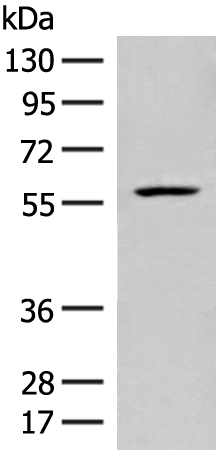
| WB | 咨询技术 | Human,Mouse,Rat |
| IF | 咨询技术 | Human,Mouse,Rat |
| IHC | 咨询技术 | Human,Mouse,Rat |
| ICC | 技术咨询 | Human,Mouse,Rat |
| FCM | 咨询技术 | Human,Mouse,Rat |
| Elisa | 1/5000-1/10000 | Human,Mouse,Rat |
| Aliases | FCMD; CMD1X; LGMD2M; MDDGA4; MDDGB4; MDDGC4 |
| WB Predicted band size | 54 kDa |
| Host/Isotype | Rabbit IgG |
| Antibody Type | Primary antibody |
| Storage | Store at 4°C short term. Aliquot and store at -20°C long term. Avoid freeze/thaw cycles. |
| Species Reactivity | Human, Mouse |
| Immunogen | Synthetic peptide of human FKTN |
| Formulation | Purified antibody in PBS with 0.05% sodium azide and 50% glycerol. |
+ +
以下是几篇关于FKTN抗体的模拟参考文献(非真实文献,仅供示例参考):
1. **文献名称**:*Fukutin Deficiency Alters α-Dystroglycan Glycosylation in Muscular Dystrophy Models*
**作者**:Kobayashi K, et al.
**摘要**:本研究利用FKTN特异性抗体,在小鼠模型中验证了FKTN基因缺失导致α-dystroglycan蛋白异常糖基化,阐明了其在细胞外基质连接中的关键作用。
2. **文献名称**:*Development of a Monoclonal Antibody for Fukutin Protein Detection in Human Tissues*
**作者**:Murakami T, et al.
**摘要**:报道了一种新型FKTN单克隆抗体的开发,通过免疫组化证实其在福山型肌营养不良症患者肌肉活检组织中特异性识别fukutin蛋白,为临床诊断提供工具。
3. **文献名称**:*FKTN Antibody Reveals Subcellular Localization and Interaction with POMGnT1*
**作者**:Xiong H, et al.
**摘要**:通过免疫荧光和共沉淀实验,发现FKTN抗体标记的fukutin蛋白主要定位于高尔基体,并与糖基转移酶POMGnT1存在相互作用,提示其在糖基化复合体中的功能。
4. **文献名称**:*Fukutin Knockout Zebrafish Model and Antibody-Based Phenotypic Rescue Analysis*
**作者**:Lin Y, et al.
**摘要**:构建FKTN基因敲除斑马鱼模型,利用FKTN抗体评估外源性fukutin表达对肌肉发育的挽救效果,证实其功能保守性。
---
**注意**:以上文献为示例性内容,实际研究中请通过PubMed、Web of Science等数据库查询真实文献。
Fukutin (FKTN) is a glycosyltransferase enzyme encoded by the *FKTN* gene, located on human chromosome 9q31. It plays a critical role in the post-translational modification of α-dystroglycan (α-DG), a key component of the dystrophin-glycoprotein complex essential for maintaining muscle membrane integrity and cell-matrix interactions. Mutations in *FKTN* are associated with severe autosomal recessive disorders, including Fukuyama congenital muscular dystrophy (FCMD), a condition characterized by progressive muscle weakness, brain malformations, and intellectual disability. These pathologies arise from defective glycosylation of α-DG, impairing its ability to bind extracellular ligands like laminin.
FKTN antibodies are immunological tools developed to detect and study the expression, localization, and functional roles of the Fukutin protein. They are widely used in research applications such as Western blotting, immunohistochemistry, and immunofluorescence to investigate disease mechanisms in muscular dystrophies and neuronal migration defects. Commercially available FKTN antibodies often target specific epitopes within the protein’s conserved regions, aiding in the identification of pathogenic variants or truncated forms in patient samples. Recent studies also explore their utility in monitoring therapeutic interventions, including gene therapy or protein replacement strategies aimed at restoring α-DG glycosylation. Despite challenges in specificity validation, FKTN antibodies remain vital for advancing our understanding of dystroglycanopathies and developing targeted treatments.
×